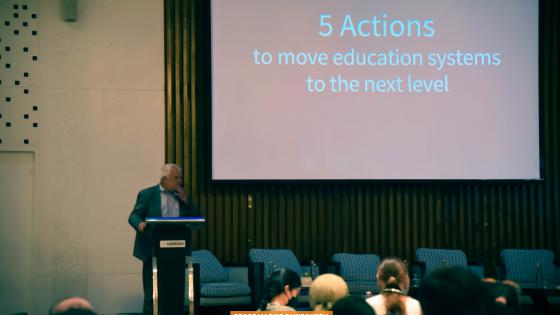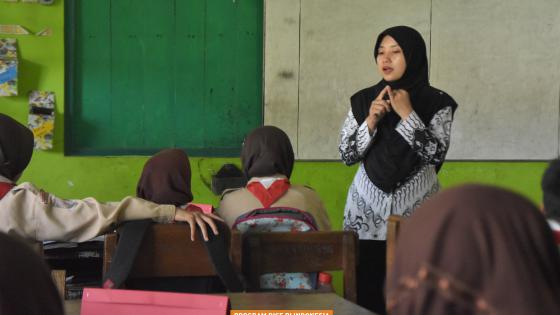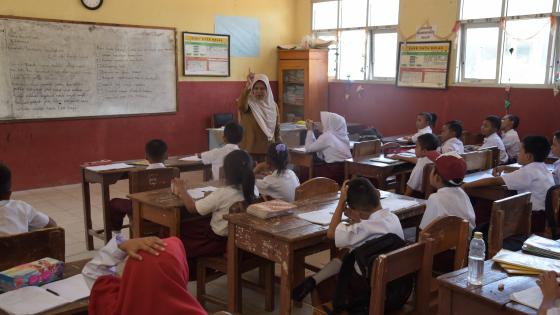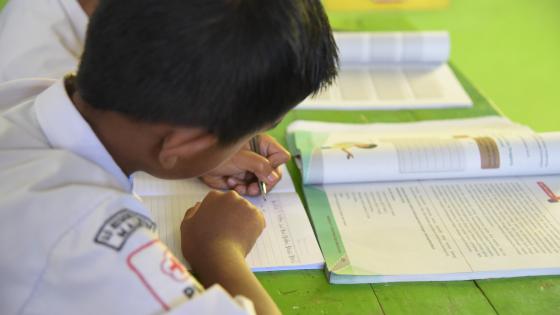Students at East Nusa Tenggara are enthusiastic during class. | Photo: Goldy F. Dharmawan
![]()
-
This article is republished from The Conversation Indonesia.
-
After decades, 89% of Indonesian children are in schools. But only a few are actually learning well as shown in the results of Indonesian National Assessment Program. Indonesia was also still ranked in the lowest ten in the Programme for International Student Assessment (PISA). Thus, following a recent global trend in education, Indonesia should shift its education goal from enrolment to include learning. How?
Research shows the teacher is a key to learning improvement. What teachers know, do and care about accounts for 30% of success in students’ learning. According to an interview with an officer with a national agency, Indonesia has allocated 52% of the 2017 education budget for teachers.
Despite the huge percentage of the education budget being spent on teachers, including to raise their salaries, their performance has not yet improved. Nor has student learning. What was missing?
We have done a diagnostic study, a preliminary part of Research on Improving Systems of Education (RISE). We analysed education policy documents and interviewed education stakeholders such as policy makers, teachers and experts. We found passion is believed to be the “must have” characteristic for good teachers. This quality has commonly been assumed to improve teaching and increase learning.
We looked into the concept to find whether there really is a connection between passion and quality of teaching, and whether the Indonesian government has a clear guideline on how to measure passion.
Teachers’ Passion and Its Impact on Learning
Research into teacher quality finds having passion differentiates excellent or expert teachers from mediocre teachers. Expert teachers will pay great attention to how students attain knowledge and how they interact with students. Their feelings and emotions are attached to their sense of responsibility about achieving success in their work.
Passion could be the love of the knowledge itself or to achieving students’ potentials. As a concept, the understanding of passion in the Indonesian context is similar to that of education scholars.
According to our interviewees (education authorities, policymakers, experts, principals), passion is the internal drive that keeps teachers improving and developing their skills and methods. Continuous improvement of teaching skills, according to Patrick, Hisley and Kempler (2000), will not only be good for teachers themselves but also for their pupils.
If not managed well, though, passion might have a negative impact on a teacher, such as burnout. In addition, several studies have tried to find a correlation between teacher passion and student learning, but empirical investigation of teacher passion is still lacking. Scholars have yet to achieve a consensus on a “theory of passion”.
If passion is essential to high-quality teaching, but no clear-cut theory of passion is available, how then do we identify and measure passion?
How to Identify Passion
Some see passion in teaching as enthusiasm. Others define it as commitment to the profession and dedication to student learning. In Indonesia, as mentioned in Teacher Law No. 14/2005, passion in teaching is labelled as “calling of the soul”, or panggilan jiwa.
As the popularity of the teaching profession in Indonesia is increasing, how can the Indonesian government ensure the new batches of teachers have passion as stipulated in the 2005 Teacher Law?
Unfortunately, we have not found clear guidance from the government on how passion should be embedded in Indonesia’s teacher education, recruitment or professional development.
How to Nurture Passion? Or is it Nature?
Previous studies have shown that interest in the teaching profession has increased since the implementation of professional allowances. Thus, motivation to enter teaching colleges may not necessarily be driven purely by interest in becoming a teacher, or panggilan jiwa, but due to the (relatively) attractive salary.
As our interviewees suggested, a teacher who lacks interest may be harmful to students’ learning. Such a teacher will only ensure that they follow authorities’ instructions without considering students’ needs.
Therefore, it is critical for Indonesia’s teacher colleges and other relevant stakeholders to develop a system to identify the passionate one from the pool of applicants. Then, any amount of passion they have at the beginning of teacher education should “be fostered” through their teaching career.
Echoing an education scholar, John Hattie, our government should “focus on … identifying, esteeming and encouraging excellent teachers, wherever they may be”. Attracting and selecting passionate teacher college applicants is as important as nurturing and maintaining passions among teachers. Hence, the effort should be coherent and sustainable.
Interestingly, one of our informants, a school principal, argued that the previous teacher education programme, Sekolah Pendidikan Guru (SPG), was “producing” a better quality of teacher. Compared to the current teacher education, a four-year college education, our interviewee argued that SPG provided more classroom experience in which mentors fostered enthusiasm for teaching and students.
Various sources support the idea that passion is essential in improving teacher quality. It is important to note, however, that passion is not a silver bullet in improving the quality of education. Passionate teachers still need supportive systems, such as proper incentives, adequate preparation to deal with the demanding nature of the profession, access to teacher networks and professional development, as well as passionate colleagues and mentors.
Supportive systems will not only attract the best and most passionate people into teaching but also improve teachers’ qualities. At the end of the day, supportive systems will benefit both our teachers and students’ learning progress.









